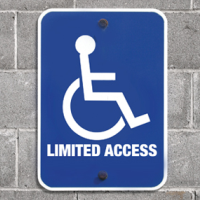People with Disabilities Have Lousy Access at State Websites, Including Covered California

California law has required state government websites to be accessible by people with disabilities since 2003. According to the California State Auditor, that’s also how long state websites have not followed the law.
A report (pdf) this month from State Auditor Elaine Howle looked at four big agencies and found they all had multiple critical violations that would prevent disabled people from completing critical communications with government.
The worst was Covered California, but Community Colleges, the Department of Human Resources (CalHR) and the Franchise Tax Board were all found to be profoundly deficient.
Covered California had 55 website pages with distinct violations out of 57 reviewed. Seven pages shared common violations. More than 300 serious violations were found on the website and some content was “totally inaccessible” to users. An application for health insurance could not be started without using a mouse, a limitation for those restricted to keyboards.
The auditor conceded that there weren’t many complaints made directly to Covered California about accessibility, but that might have been because the site lacked required contact information. “When departments do not provide multiple forms of contact information, the risk increases that users will be unable to complain about Web accessibility problems they may encounter so that departments can fix those issues,” the report said.
The Public Policy Institute of California (PPIC) reported that 47% of Californians said they use the Internet to access government resources in 2013, up 4% from 2008. Approximately 4 million Californians have a disability, including 789,000 suffering from vision loss.
People with disabilities access the web with a range of technical assistance―screen readers that vocalize, screen magnifiers, voice recognition software, special captioning―that have been around for awhile. Basic webdesign should incorporate these options when appropriate and, especially, when necessary and required by law.
Federal regulations set specific technical requirements for compliance with laws concerning disabilities, and California, as is their wont, augmented them. The auditor used them to judge the state websites.
The Franchise Tax Board prevented users without a mouse from registering an online account. Without the account, users can’t submit tax returns through the board’s CalFile service.
Disabled online applicants to Community Colleges who were using screen readers could not detect a notice that the page they were working on was about to time out. They would be unceremoniously logged out of the system and forced to start over.
Screen-reader software was also a problem for users of the CalHR website. The software, which reads a page aloud to the user, skipped some questions in an online exam because of bad computer coding. In this case, they had a workaround:
“Persons using screen readers would have had to leave the exam question response area and use other methods, such as browsing the surrounding text on the web page line by line with the keyboard’s arrow keys, to try to determine what information they should enter.”
The auditor said that many of these problems could have been prevented if the state properly tested websites for accessibility and facilitated complaints about failings.
All four of the entities reviewed by the auditor generally agreed with the report’s critique, but the tax board seemed to be weaseling around the edges. The auditor said the board rewrote one of the report’s recommendations, but, “to be clear, we recommended that Franchise Tax Board resolve all of the accessibility violations that our consultant identified, not just the violations we describe in detail in our report text.”
The auditor also found it strange that the board argued it didn’t have to engage with all the report’s contentions because only a relatively few people are involved. That, the report said, is “puzzling given that the web accessibility standards it violated are designed to ensure website access for a minority population of users.”
–Ken Broder
To Learn More:
State Websites Fail Its Disabled Residents (by Steven Greenhut, U-T San Diego)
Audit Finds Accessibility Issues on Covered California Website (California Healthline)
Departments Must Improve Website Accessibility so That Persons with Disabilities Have Comparable Access to State Services Online (California State Auditor) (pdf)
- Top Stories
- Controversies
- Where is the Money Going?
- California and the Nation
- Appointments and Resignations
- Unusual News
- Latest News
- California Forbids U.S. Immigration Agents from Pretending to be Police
- California Lawmakers Urged to Strip “Self-Dealing” Tax Board of Its Duties
- Big Oil’s Grip on California
- Santa Cruz Police See Homeland Security Betrayal in Use of Gang Roundup as Cover for Immigration Raid
- Oil Companies Face Deadline to Stop Polluting California Groundwater





